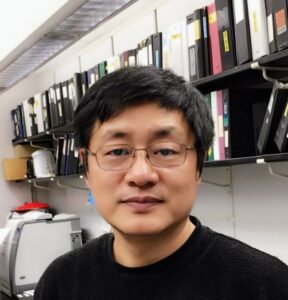Meet Dr. Zhijun Li

My name is Zhijun Li; I am very excited for this opportunity to join BCBP and Prof. Qi Zhang’s Lab as a Research Assistant Professor. I received my Ph.D. in a joint program of science and engineering, from Saitama University and Cellular and Molecular Biology Unit of RIKEN in Japan. I hope my research projects, which bridge biochemistry, immunology, and cancer biology, both complement and enhance current efforts of our department to investigate fundamental mechanisms of biochemistry and biophysics, related to cancer development and to translate scientific discoveries into new treatments. Further, I am eager to share my expertise in biochemistry, biophysics, and cellular biology with the lab, department, and greater scientific communities.
I have been a member of Dr. Yue Xiong and Dr. Al Baldwin’s lab at the Lineberger Cancer Center, working on two cytoplasmically localized cullin-ring family E3 ligases, Cul9 and Cul7. I found that the functions of CUL9 in regulating cell proliferation and maintaining genomic integrity are mainly mediated by p53, and that CUL9 is a critical p53 activator. To understand the mechanistic role of CUL9, I established the mice model of Cul9 KO and Cul9-p53 binding deficient knock-in. Using those MEF cells I successfully identified Survivin as one of the critical substrates of CUL9 by mass spec-based proteomic approaches. Most recently, I have been studying the metabolic and epigenetic control of antitumor immunity and focused on the function of TET2 DNA dioxygenase that is frequently mutated in human hematopoietic malignancies to identify potential therapeutic targets for immunotherapy of solid tumors.
I am excited to utilize my extensive experiences in these fields to contribute to our department’s pursuit of basic science discoveries; specifically, towards the mechanism of RNA demethylation in immune response during tumor formation and advancing the understanding of cell immortalization. I am excited by the prospect of contributing to the rich community of researchers within the Department of Biochemistry and Biophysics and the UNC School of Medicine more broadly.
I look forward to working with you all!
Zhijun Li, Ph.D
